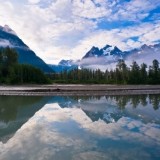It’s been a few days now since our momentous federal election and I’m trying to make some sense of it from the environmentalist standpoint.
The good news is, of course, the election of Elizabeth May – even though as one lone voice in parliament she can do little in any formal sense.
She can be effective at getting her message out both in question period and “debate” if the media want her to get coverage. They will certainly cover her activities so long as she keeps matters interesting. It’s the old “dog bites man/man bites dog” rule of journalism. As long as Ms. May can give the media interesting stories, her work will be reported.
I hope that the Green Party can increase its size and influence but it would take a braver man than I to ever see them for Official Opposition, much less government. We at the Common Sense Canadian will, it goes without saying, offer time and space to Ms. May and any other political parties or candidates who pledge to preserve our environment.
It’s an interesting situation re BC’s political scenario. BC doesn’t usually mirror federal political experiences. In fact it’s often the reverse. I was involved in a provincial election where there was a national election as well. I was astonished to see lawn signs supporting me as a Socred provincially and the NDP nationally. Manitoba and Saskatchewan are famous for this sort of vote splitting.
Interestingly, there was huge joy both at Tory and NDP post-mortems. Each saw their results as voter support of their party – and it was. What will become of the Liberals is for another day.
I suspect that there was great joy in both the BC Liberal and NDP camps. The Liberals will declare that what happens nationally to the Liberals doesn’t affect them, though I must churlishly remind Premier Clark that this wasn’t her view in the campaign. The premier will no doubt see this as a great victory for capitalism – Fraser Institute variety – and be tempted to have an early election to take benefit of the BC voter’s lurch to the right.
Except that’s not what happened. The Tories popular vote was up about 2% and the NDP up about 6%. Indeed, on those results the NDP is the one that should be antsy for an election, especially if either/both the Tories and BC First parties gain some traction.
The results are, sad to say, good news for those who want more fish farms, more private power, more pipelines and more oil tanker traffic. At least on the surface, for we’ll never really know how British Columbians feel about these issues until they are issues in a provincial election.
Unless Premier Clark is that rare politician that wants citizens to be fully informed before going to the polls, she will call a snap election in hopes that British Columbians will not be fully informed on these issues.
We mustn’t lose sight of the fact that the environmental catastrophes I mention are not offset by great financial gains – quite the opposite.
Fish Farm profits go mainly to Norwegian shareholders, while the private power producers send their ill-gotten gains to large out-of-province and out-of-country shareholders. The big loss is, of course, BC Hydro, which – according the Erik Andersen, an economist specializing in government finances – would, if in the private sector and unable to raise rates with impunity, be bankrupt or in bankruptcy protection.
In short, the environmental losses – much including our wild salmon – far from bringing revenue into the province cost us big time.
We at the Common Sense Canadian are concerned about a Tory majority and the possibility of it meaning Premier Clark will win a new majority. If British Columbia gives her that majority, they will be accepting the environmental outrages I mentioned above.
I don’t believe that British Columbians will buy those environmental catastrophes in a fair fight and we see it as our job to make sure it is fair.
We at the Common Sense Canadian pledge that we will have those issues on the table when the next election comes.
Thereafter, it’s BC’s choice.







